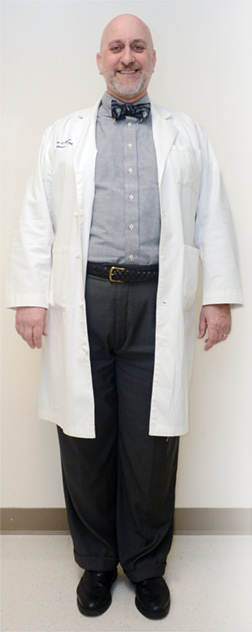CAPT, MC, USN [Ret]
Adult Inpatient Psychiatry
Naval Medical Center Portsmouth
 Gary Munn was commissioned an ensign in the United States Navy in June, 1976, upon graduation from the U.S. Naval Academy. He found an easy rapport with the sailors he supervised as a division officer: “They’d come to me for counseling,” he says, “and I had insights into some of the tragedies in their lives. I wanted to be able to help them.” He earned his medical degree at New York Medical College in Valhalla, New York, in 1988, and completed both his internship and residency in psychiatry at Naval Medical Center Portsmouth.
Gary Munn was commissioned an ensign in the United States Navy in June, 1976, upon graduation from the U.S. Naval Academy. He found an easy rapport with the sailors he supervised as a division officer: “They’d come to me for counseling,” he says, “and I had insights into some of the tragedies in their lives. I wanted to be able to help them.” He earned his medical degree at New York Medical College in Valhalla, New York, in 1988, and completed both his internship and residency in psychiatry at Naval Medical Center Portsmouth.
During a long and storied career in the United States Navy, Dr. Munn had a number of experiences that provided him the opportunity to make significant contributions to the advancement of military medicine. From 1992-1995, while assigned to U.S. Naval Hospital Sigonella, Dr. Munn served as both Mental Health Department Head and Chairman of the Bioethics Review and Medical Records Review Committees, as well as the psychiatric advisor to the Family Advocacy Case Review Committee. In 1995, he deployed to the Baltic Sea for BALTOPS 1995, aboard USS OLIVER HAZARD PERRY, to demonstrate shipboard medicine capacity to representatives of the former Soviet Bloc nations.
Returning to Portsmouth in 1995, he served in numerous positions in inpatient and Emergency Psychiatry. In 1997, he deployed to Roosevelt Roads, Puerto Rico aboard USS BATAAN in support of recovery and clean-up efforts following Hurricane Georges. A year later, he was sent to U.S. Naval Hospital Guam, where he ensured continuance of the mission by providing interim psychiatric coverage during a shortage. He went on to serve on the 2nd Fleet Service Support Group platform at Camp Lejeune, where he trained staff to identify and manage Combat Stress. He was named Head of the Psychiatry Department in 2001. In 2003, he received the call to deploy with BRAVO Surgical Co to Kuwait and Iraq, where he served as the Officer in Charge of the Combat Stress Platoon. Under his leadership, his team had a 100 percent return-to-duty rate.
Later in 2003, Dr., Munn was transferred to National Naval Medical Center, Bethesda as the Department Head for Adult Inpatient Behavioral Health. In 2004, he was awarded the H. James Sears Award for Excellence in Navy Psychiatry. In 2007, he was recognized as the Naval Medical Center Portsmouth Psychiatry Residency Teacher of the Year.
Dr. Munn returned to Kuwait in 2007 as the Officer in Charge of COSTNAV [Combat and Operational Stress Team, Navy], supervising the provision of mental health care at four remote bases. After completing his tour overseas, Dr. Munn returned to serve on the psychiatric wards at Naval Medical Center Portsmouth, where he also expanded the ECT Services.
Dr. Munn retired from the Navy in 2008, but says, “I was really blessed as I was approaching retirement. A company with a contract opening at Portsmouth Naval Hospital offered me a position. I was able to start work as a contractor the day after I retired.” He practices exclusively at Naval Medical Center Portsmouth, while holding associate professorships in clinical psychiatry and behavioral sciences at Eastern Virginia Medical School and the Uniformed Services University. His years of experience in military inpatient psychiatry are unparalleled.
Dr. Munn and his colleagues at Naval Medical Center Portsmouth also support the airmen at Langley Air Force Base, soldiers at Ft. Eustis and Ft. Story, and Coast Guardsmen locally and in Elizabeth City. He adds, “we get referrals from around the world – the entire eastern half of the United States as well as Europe and Africa. Whenever service members are in need of inpatient psychiatric treatment, Portsmouth is generally where they come.”
Practicing psychiatry in the military is gratifying, Dr. Munn says, because “we’re not operating under the constraints of insurance companies, or answering to third party payers. We’re able to provide the care to our service members and veterans in ways we feel most appropriate, and we have the support of the command and the Congress and federal government to do just that.”
However, he acknowledges, the practice of military psychiatry has also gotten more complex over the years. “We’ve always had to balance having to understand the needs of the military in addition to the emotional and medical needs of the service member,” he explains, “and doing our best to not compromise between the two, but to carve a new path so the needs of both are best met.”
These servicemen and women are fighting a war on two fronts, with an all-volunteer force, and Dr. Munn is treating soldiers and sailors who are making their fourth, fifth or sixth deployments. “It’s tough on the service members and their families, and mental health services are in high demand within the department of defense,” Dr. Munn says.
Not surprisingly, between 2007 and 2015, Dr. Munn received more and more inpatient psychiatric referrals related to substance abuse disorders. He helped establish the Substance Abuse and Detoxification Unit at Naval Medical Center Portsmouth.
The demands on service members seem greater than they’ve ever been, he notes, “But whereas psychiatry used to be the ‘stepchildren’ of military medicine – last in line to be considered for budgetary issues – now the value of military mental health is absolutely recognized, and there are plenty of resources being directed toward us. We can take the best care of our beneficiaries.”

